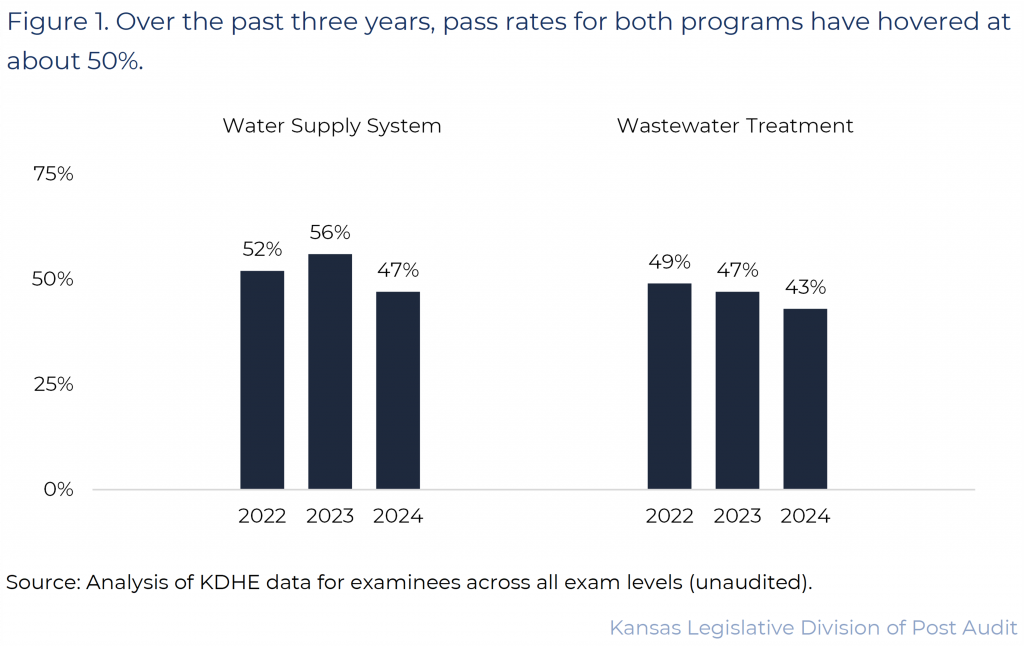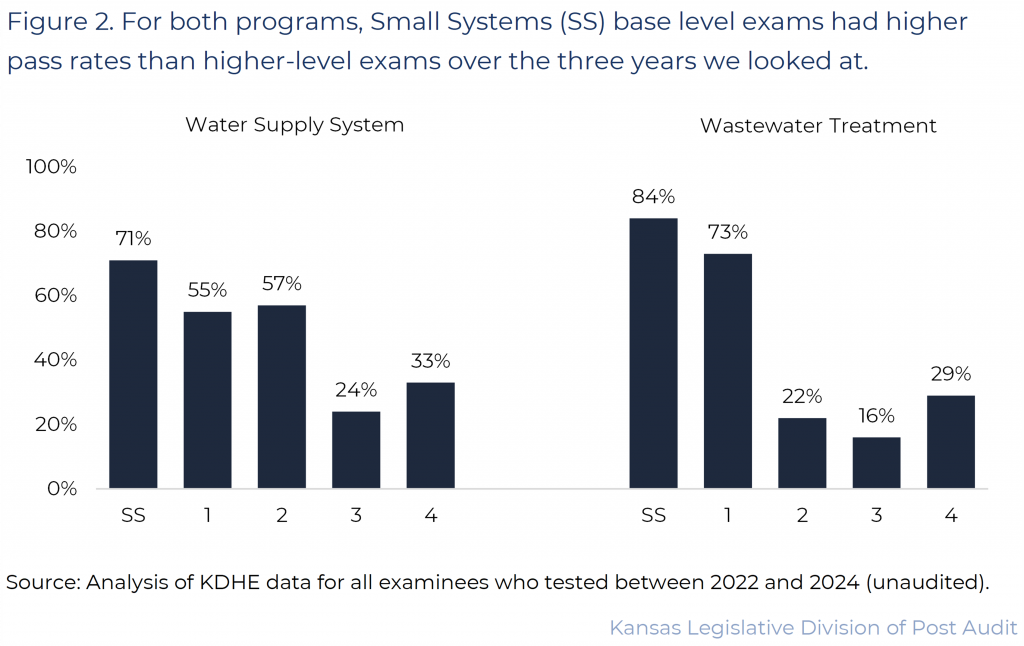Evaluating the State’s Water Systems and Wastewater Treatment Operator Certification Program (Limited-Scope)
Introduction
Representative Jim Minnix requested this limited-scope audit, which was authorized by the Legislative Post Audit Committee at its April 24, 2024 meeting.
Objectives, Scope, & Methodology
Our audit objective was to answer the following question:
- What were the results of the water supply system and wastewater treatment certification exams in 2023?
We reviewed Kansas statutes and administrative regulations to identify the requirements the Kansas Department of Health and Environment (KDHE) has for water supply system and wastewater treatment operator examinations. We received and analyzed test results for water supply and wastewater treatment operator examinees in calendar years 2022 through 2024 from KDHE to determine pass rates for various exam levels. We extended the scope to 3 years to provide a more comprehensive answer to the question. Finally, we spoke with KDHE officials about our preliminary findings and to gather history and context about the exam process.
We did not make any specific recommendations for this audit.
Important Disclosures
Audit standards require us to report limitations on the reliability or validity of our evidence. In this audit, we used KDHE’s examination data. We performed limited tests for inconsistencies, inaccuracies, and incomplete data. Within the wastewater treatment operator data, we identified a very small number of entries (13 of 1,152, or 1%) with incorrect locations or dates. This did not directly affect our use of the data. We also held a control interview with KDHE staff to understand how the data is put together. Lastly, we selected a random sample of 30 base-level exams for water supply and wastewater treatment operator exam scores to corroborate against other KDHE records (60 total). While 58 scores matched, KDHE was unable to produce supporting documentation for 2 examinees. For both examinees, we were able to corroborate the subsequent test score that existed. No source outside of KDHE for this data exists, so we were unable to compare our data with any independent dataset. Overall, we think the data was sufficiently reliable for our purposes, although we didn’t do more robust testing given the limited scope of the audit.
Our audit reports and podcasts are available on our website www.kslpa.gov.
Between calendar years 2022 and 2024, only about half of individuals passed their Water Supply or Wastewater Treatment Operator examinations.
Background
In Kansas, state law requires that all water supply systems and wastewater treatment facilities are supervised by a certified water operator.
- Beginning in 1976, all water supply systems and wastewater treatment facilities in Kansas which are used or intended to be used for the public must be supervised by certified operators. This requirement gave rise to two separate certifications: (1) the water supply certification program and (2) the wastewater treatment certification program.
- Operators must obtain the certification corresponding with their workplace (either a water supply or wastewater treatment facility). KDHE is responsible for administering these certification programs.
- Within both certification programs, operators can be certified at five different classes: Small Systems (“base level”), Class 1, Class 2, Class 3, and Class 4. Those classes correspond to different types and sizes of facilities. Small Systems exams are the most foundational and act as the base exams to be certified as an operator. Facilities at which individuals can operate depend on the certification level they hold. For example, operators must hold higher certifications, up to Class 4, to operate larger facilities. Each class has its own certification exam.
- Administrative regulations require applicants for either type of operator certification to have a high school diploma or GED, complete on-the-job experience, and pass an examination. Higher class examinations also require more experience (varying from 6 months to 2 years). Generally, individuals can take the required exam once they meet the experience requirements. In 1975, state law established an exam fee not to exceed $25.
Kansas regulations require that KDHE administers certification exams at least twice annually, which it does.
- K.A.R. 28-16-32 requires KDHE to offer testing at least 2 times a year. No requirements exist for exam locations. In other words, KDHE can choose the exam locations.
- We reviewed tests administered between 2022 and 2024 and found KDHE offered between 7 and 9 examination dates during each of the calendar years we reviewed. This surpassed the requirement of 2 exam dates annually.
- KDHE has 6 district offices across the state. Using the boundaries of KDHE’s district as “regions”, we determined that each year from 2022 through 2024, each region had at least 1 examination date. Having examinations spread across the state can make exams more accessible.
- Officials told us that all exam levels for both programs are offered on each date.
- Both the water supply and wastewater treatment examinations are written tests which require a 70% to pass. Those who score between a 50% and 70% can retake the exam up to three times per year. Those who score below a 50% need to provide evidence to KDHE of having attended training to retake the exam.
Examination Pass Rates
From 2022 to 2024, Water Supply and Wastewater Treatment examinations had relatively low pass rates, hovering at or below 50%.
- We reviewed KDHE exam data for all examinees who took a water supply or wastewater treatment examination between January 2022 and December 2024.
- KDHE data showed a pass rate for both programs combined of 50.7% (431 of 850) in 2022, 51.5% (384 of 745) in 2023, and 45.5% (445 of 978 examinees) in 2024.
- Figure 1, on the next page, shows the annual pass rate by program across those 3 years.

- As the figure shows, 2024 had the lowest pass rates for both the water supply and the wastewater treatment examinations. However, 2024 also had the highest number of total test takers.
- We noted multiple instances of individuals taking the same test two or more times. For example, within the drinking water program Small Systems, the average number of exams per person was 1.2. Specifically, 24 people took the test twice, 6 people took the test 3 times, and 1 person took the test 5 times across the 3 years we analyzed. For the same program, the Class 1 average number of exams per person was 1.4, ranging from 52 individuals taking it twice to 1 person taking it 6 times. We didn’t attempt to isolate or deduplicate the number of examinees in the remaining data.
Those taking the Small Systems exams in either program had higher pass rates.
- There is no rule that someone must have passed a lower-level examination to take a higher one in that series. However, Kansas Administrative Regulations establish experience requirements (for instance, 1 or 2 years) to prevent new operators from taking a higher-level examination.
- KDHE officials explained that it is typical to see operators start with a Small Systems or Class 1 certification and later test for a higher certification. Additionally, many Class 3 or Class 4 systems will require certification within a short window after hire, before adequate experience has been gained for Class 3 or Class 4 certification. In these cases, the expectation is that applicants begin with a lower certification and work their way up.
- Figure 2 provides pass rates across all 3 years for each of the 5 levels by program. Generally, lower-level certifications had higher passing rates.

- As shown in the figure, within the wastewater treatment operator program, small systems and class 1 examinations had significantly higher pass rates than Class 2, Class 3, and Class 4 examinations. Officials told us that exams get progressively more difficult given the increasing complexity of the system the tests are geared towards. Additionally, officials told us they began offering an optional pre-test for these two exams, in partnership with Kansas Rural Water Association, in 2021.
KDHE officials think low pass rates are largely due to examinees not adequately preparing for the exam, but don’t indicate poor exam quality.
- KDHE officials agreed with our observations of relatively low pass rates and a fair number of repeat test takers.
- Although it is not required by regulation or statute, KDHE provides training resources to examinees. For example, the KDHE website has a link to the annual calendar showing several trainings offered throughout the state, a small systems training manual, “Need to Know” document for both programs, and several PDF documents from past online trainings. Lastly, an FAQ document on the operator certification program directs individuals to additional materials available through the University of California-Sacramento.
- Generally, examinees are not required to review specific material or attend a specific training before they take a certification examination. Officials noted that many examinees don’t make use of the available trainings and resources. When individuals don’t invest time to learn and retain the information, they may not be adequately prepared for the test.
- KDHE officials also said that its primary goal with these certification examinations is to produce competent operators. They contended that part of this competency comes from individuals being willing to take the test seriously and adequately prepare rather than viewing the exam as a formality.
- KDHE officials believe the exams include relevant and important information for operators to know. Passing the test indicates operators have the knowledge they need for the job.
Although the contents of the exams have not changed much over time, KDHE does look for ways to improve them.
- According to KDHE officials, water supply operator examinations are difficult to substantively change because KDHE follows Environmental Protection Agency (EPA) guidance based on the Safe Drinking Water Act. Officials also told us substantial exam content changes in this program could jeopardize federal grant moneys.
- Nevertheless, officials told us they reviewed water supply operator examination questions and made language updates in 2021.
- Agency staff told us KDHE reviewed the wastewater treatment examination questions specifically for the Small System and Class 1 examinations in 2020-2021. While new questions weren’t created, some questions were removed to avoid incorrect or confusing language (such as questions beginning with “Generally,” that have no clear, specific answer).
- At the time of the audit, officials reported they were in the process of reviewing the remaining Wastewater Treatment examination questions (those found in Class 2, Class 3, and Class 4 examinations).
The 2024 Legislature allowed the creation of a special fund for KDHE to collect certification fees, but did not increase the $25 exam fee.
- House Bill 2633 would have removed the $25 statutory cap on certification fees and would have allowed the Secretary of KDHE to deposit certification fees into the Water Program Management Fund. The bill didn’t pass.
- The 2024 legislature did pass House Bill 2525 which allowed the Secretary of KDHE to deposit certification fees into the Water Program Management Fund, but that bill didn’t remove the cap of the $25 certification fee.
- Officials told us removing the statutory cap on fees would have allowed the agency to consider contracting with a national testing agency (Water Professionals International) to maintain and administer some or all its water operator examinations.
- Officials also said they are currently exploring contracting with community colleges and vocational schools to administer the tests electronically to make them more accessible. However, that’s likely not possible with the $25 cap.
- Our calculations show that the statutory fee of $25, set in 1975 and unchanged in nearly 50 years, would be $112 in July 2024 dollars.
Recommendations
We did not make any recommendations for this audit.
Agency Response
On January 17, 2025, we provided the draft audit report to KDHE. Because we did not make any recommendations, a written response from KDHE was optional. KDHE chose not to submit a response.
